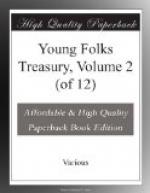“Oh yes. Well, we were passing through a corn-field, when he asked me whether it was eaten or not.”
“And didn’t you know the meaning of this, father? He simply wished to know if the man was in debt or not; because, if the owner of the field was in debt, then the produce of the field was as good as eaten to him; that is, it would have to go to his creditors.”
“Yes, yes, yes, of course! Then, on entering a certain village, he bade me take his clasp-knife and get two horses with it, and bring back the knife to him.”
“Are not two stout sticks as good as two horses for helping one along on the road? He only asked you to cut a couple of sticks and be careful not to lose his knife.”
“I see,” said the farmer. “While we were walking over the city we did not see anybody that we knew, and not a soul gave us a scrap of anything to eat, till we were passing the cemetery; but there some people called to us and put into our hands some chapatis and kulchas, so my companion called the city a cemetery, and the cemetery a city.”
“This also is to be understood, father, if one thinks of the city as the place where everything is to be obtained, and of inhospitable people as worse than the dead. The city, though crowded with people, was as if dead, as far as you were concerned; while, in the cemetery, which is crowded with the dead, you were saluted by kind friends and provided with bread.”
“True, true!” said the astonished farmer. “Then, just now, when we were crossing the stream, he waded through it without taking off his shoes and pajamas.”
“I admire his wisdom,” replied the girl. “I have often thought how stupid people were to venture into that swiftly flowing stream and over those sharp stones with bare feet. The slightest stumble and they would fall, and be wetted from head to foot. This friend of yours is a most wise man. I should like to see him and speak to him.”
“Very well,” said the farmer; “I will go and find him, and bring him in.”
“Tell him, father, that our beams are strong enough, and then he will come in. I’ll send on ahead a present to the man, to show him that we can afford to have him for our guest.”
Accordingly she called a servant and sent him to the young man with a present of a basin of ghee, twelve chapatis, and a jar of milk, and the following message: “O friend, the moon is full; twelve months make a year, and the sea is overflowing with water.”
Half-way the bearer of this present and message met his little son, who, seeing what was in the basket, begged his father to give him some of the food. His father foolishly complied. Presently he saw the young man, and gave him the rest of the present and the message.
“Give your mistress my salaam,” he replied, “and tell her that the moon is new, and that I can find only eleven months in the year, and the sea is by no means full.”




